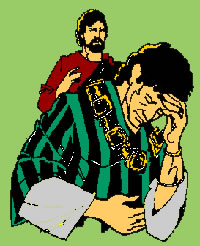
28th Sunday in Ordinary Time Year B
‘Lord, what should I do?’ - a question essential to a Christian life well lived. The alternative – drifting along without responsible reflection – is a wasted life. The reply of Jesus to the young man who puts this question to him is surprising. The community that gave us Mark’s gospel certainly believed that Jesus was God’s unique Son. The response given by Jesus reflects a constant pattern in his teaching: he wanted to lead his hearers to the Father. Like the young man, we will only find the answer to the question of what direction our life should take in the presence of the One Jesus called his ‘God’ and ‘Father’. The life of all who live ‘in Christ’ is one and the same; there are, however, different forms of discipleship. This paradox has given rise to some confusion in the Church’s life when ‘states of life’ have been compared. The first response of Jesus in this incident is to urge fidelity to ‘the commandments’ – the pattern of life to which most of the Lord’s disciples are called. However, this man was seeking a way that went beyond what had been recommended. Jesus ‘looked steadily at him and loved him’, and he urged him to ‘sell everything he owned and give the money to the poor’, and to join Jesus in the radical detachment that was Jesus’ own way of life - for the sake of the Kingdom. For many centuries, the comparison of the two ways of life indicated by Jesus has been expressed in misleading terms. The radical following has been spoken of as a ‘higher’ form of Christian life. But life in Christ, as has been said, is one. The life that is better for each person is the life that they are called to by God – there they will find the way to the greatness that is to be theirs in the designs of God. Since Vatican II this confusion has been left behind. Today, however, it is being suggested that as we have recovered an appreciation of the fact that no baptised Christian is in an ‘inferior’ state of life, we have obscured the fact that the Lord’s call to individual disciples involved different means of living discipleship. As far as means are concerned, a life lived according ‘the evangelical counsels’ – the radical renunciations of Christ himself - has a heroic excellence that needs to be more clearly affirmed, if we are to foster the ‘vocations’ the Church so sorely needs.
The reaction of the young man leads Jesus to develop a theme important for all forms of discipleship: earthly possessions can prove a great obstacle to growth of life in Christ. The disciples were amazed, because many texts of the Old Testament seemed to imply that material wellbeing is a sign of God’s blessing on a good life. Our reading from Wisdom shows that old Israel was already looking beyond this point of view. The whole life of Jesus is a corrective of this superficial interpretation of God’s ways. His final words have a lesson for disciples, whatever the form of following to which they have been called – authentic fidelity is a gift of God, ‘Everything is possible to God’. Our reading from Hebrews can serve as a commentary on the call of Jesus to make our life decisions in the presence of the Father. The ‘Word of God’ is a theme of great importance in the Old Testament. It is a Word that confronts believers with the ways of God. In Jesus we know the Word of God in person, a Word giving expression to the boundless love and generosity of the Father who calls each one of us.
John Thornhill sm

